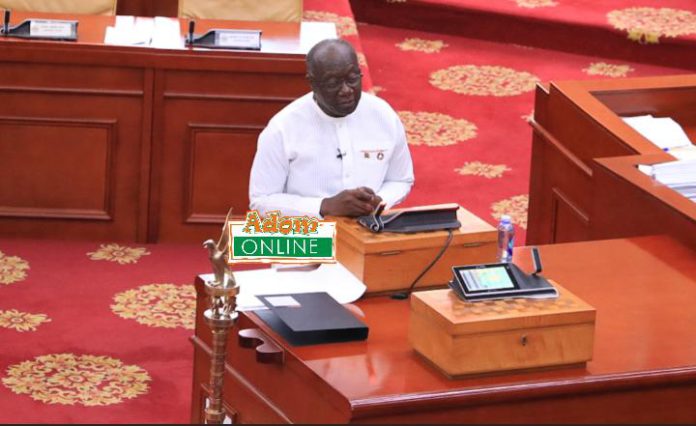Government has given an assurance that it will restrict itself to budgeted expenditure, despite 2024 being an election year.
The Minister of Finance, Ken Ofori-Atta, who gave the assurance at a meeting in London on Monday, with holders of Ghana’s international bonds, said in spite of 2024 being an election year, the government would stay within the International Monetary Fund (IMF) supported budget which would be presented to Parliament later next month.
Four months after implementing the Post-COVID-19 Programme for Economic Growth (PC-PEG)-backed IMF programme, Ghana’s economy is beginning to see some stability, with gross domestic product (GDP) growth averaging 3.1 per cent in the first half of the year.
Inflation, which reached a 22-year high of 54.1 percent in December 2022, has also declined to a 12-month low of 38.1 percent in September, and on the fiscal front, the primary balance on commitment basis for the first half of the year was a surplus of about GH¢2 billion compared to a targeted deficit of GH¢4 billion.
Gross International Reserves (GIR) also stood at $2.1 billion equivalent to 1.0-month import cover, compared with US$1.5 billion (0.6 months of import cover) recorded at the end of December 2022, with the cedi also stabilizing.
With the country going into another election year, there have been some fears in the investor community on how to sustain this growth path due to the overspending which is usually associated with election years which ends up in huge budget deficits.
Many of them are worried that the successes that have been chalked up so far under the three-year Extended Credit Facility with the IMF would be derailed in an election year.
Mr. Ofori-Atta has, however, given an assurance that the government would stay true to the programme and the 2024 budget.
“Ahead of the 2024 election year, let me assure you that we are committed to implementing the IMF-supported PC-PEG as planned, and this is what our constituents expect from us,” he stated.
“This will help us further support the strong economic recovery,” the Finance Minister added.
He said having been deeply impacted by the crisis of last year, Ghanaians now expected the government to deliver macroeconomic stability, a swift return to low inflation, and a sustained stabilisation of the value of the cedi; and not an increase in public spending.
“This is completely in line with the successful implementation of our IMF programme,” Mr. Ofori-Atta stated.
Wide-ranging policies
The minister said the government was committed to continue implementing a wide range of policy reforms, supported by the IMF.
He said its priority was to ensure fiscal and debt sustainability by amending the Fiscal Responsibility Act, 2018 (Act 982) and accelerating the procurement of the Integrated Tax Administration System.
Mr Ofori-Atta stated that the government was also focusing on financial sector reforms towards rebuilding the capital buffer of commercial banks, enhancing Bank of Ghana’s (BoG’s) inflation targeting framework, and rebuilding international reserves buffers.
“We are also working on social protection and structural reforms, including expanding the coverage and enhancing the benefits in real terms under the Livelihood Empowerment
Against Poverty Programme, the National Health Insurance Scheme and the School Feeding Programme,” he stated.
Mr Ofori-Atta was confident that the bold reforms would help secure a stable and prosperous future for the country.
DDEP, thing of the past
The Finance Minister also pointed out that all planned exchanges of domestic marketable debt had been completed, adding that the DDEP would not be reopened.
Mr Ofori-Atta said the effort made by domestic holders of public debt, including the BoG, had been significant, and that was now a thing of the past.
“New debt instruments issued by the government in the domestic market are safe and secure,” he stated.
The first part of the DDEP saw the government swap old bonds valued at GH¢82 billion for 12 new ones at reduced coupon rates and longer tenors.
The exchange of dollar-denominated local bonds of about $742 million also saw a participation ratio of 91.7 percent; the exchange of cocoa bills worth GH¢ 7.7 billion also saw a participation ratio of 97.4 percent, while the exchange of pension funds holdings of treasury bonds of about GH¢29.6 billion also saw a participation ratio of 95.3 per cent.
Mr Ofori Atta told the bondholders that the reduced coupon rates and lengthened maturities achieved through the DDEP were expected to provide the government with much-needed breathing space and to set its domestic debt to GDP on a clear downward trend.
He added that considering the new structure of domestic debt resulting from the exchanges, current domestic market interest rates were expected to remain fully consistent with a sustainable public debt path.
Under the IMF programme, the country’s debt-to-GDP is expected to reduce to 55 percent within three years.
External debt negotiation
On the external front, Mr. Ofori-Atta stated that successful completion of the external debt restructuring exercise was crucial for the country.
He said the bilateral Official Creditor Committee (OCC) co-chaired by China and France had formally committed to providing a debt treatment that would restore Ghana’s debt sustainability and ensure full financing of the IMF programme.
He said technical discussions had made significant progress and government was engaging with the OCC to negotiate the specifics of an agreement to restructure its $5.4 billion debt owed to bilateral creditors.
On the commercial side, the finance minister said two bondholder groups had been formed, made up of domestic and regional bondholders and international bondholders as it sought to restructure debts of about $14 billion.
“We have engaged in good faith discussions with both of them and shared illustrative debt restructuring scenarios in May”.
“We have now received debt treatment scenarios from both bondholder groups and expect to accelerate our constructive dialogue in the upcoming weeks,” he said.
ALSO READ:

